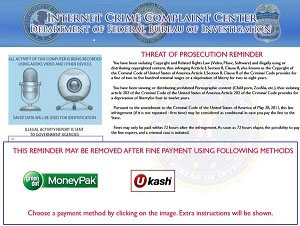FBI details latest Citadel malware that can deliver Reveton ransomware to extort money from consumers
By Michael Cooney
The Internet Crime Complaint Center, a partnership with the FBI, today issued a warning about an uptick in a new version of Citadel malware that uses the IC3’s good name to try and extort money from victims.
From the IC3: A new extortion technique is being deployed by cyber-criminals using the Citadel malware platform to deliver Reveton ransomware. The latest version of the ransomware uses the name of the Internet Crime Complaint Center to frighten victims into sending money to the perpetrators. In addition to instilling a fear of prosecution, this version of the malware also claims that the user’s computer activity is being recorded using audio, video, and other devices.
The malware lures the victim to a drive-by download website, at which time the ransomware is installed on the user’s computer. Once installed, the computer freezes and a screen is displayed warning the user they have violated United States Federal Law. The message further declares that a law enforcement agency has determined that a computer using the victim’s IP address has accessed child pornography and other illegal content.

To unlock the computer, the user is instructed to pay a fine using prepaid money card services. The geographic location of the user’s PC determines what payment services are offered. In addition to the ransomware, the Citadel malware continues to operate on the compromised computer and can be used to commit online banking and credit card fraud.
Just in August, the IC3 said another drive-by variant of Reveton malware was impersonating email from the FBI.
“We’re getting inundated with complaints,” said Donna Gregory of the Internet Crime Complaint Center (IC3) in a statement referring to the virus known as Reveton ransomware, which is designed to extort money from its victims. Reveton activates when users open a file or attachment — this one can install itself when users simply click on a compromised website. In this case, once infected, the victim’s computer locks, and the monitor displays a screen stating there has been a violation of federal law, the IC3 stated. To unlock their machines, users are required to pay a fine using a prepaid money card service.
The IC3 said the bogus message tells the user that their Internet address was identified by the FBI or the Department of Justice’s Computer Crime and Intellectual Property Section as having been associated with child pornography sites or other illegal online activity. “Some people have actually paid the so-called fine,” said Gregory, who oversees a team of cybercrime subject matter experts. Unlike other viruses, Reveton freezes your computer and the average user will not be able to easily remove the malware.”
The Reveton virus, used by hackers in conjunction with Citadel malware — a software delivery platform that can disseminate various kinds of computer viruses — first came to the attention of the FBI in 2011. The IC3 issued a warning on its website in May 2012. Since that time, the virus has become more widespread in the United States and internationally. Some variants of Reveton can even turn on computer webcams and display the victim’s picture on the frozen screen, the IC3 says.
In May the annual IC3 Internet Crime Report noted that the most common Internet crime complaints in 2011 were those involving scams that involved fraudsters pretending to be the FBI. The 2011 IC3 Internet Crime Report issued found that of the 314,246 complaints the IC3 received last year, more than 14,000 involved scamsters posing as the FBI in one shady online form or another. The 314,246 complaints represent a 3.4% increase over 2010.
The IC3 said the names of various government agencies and high-ranking government officials have been used in spam attacks in an attempt to defraud consumers by the hundreds. Government agencies do not send unsolicited emails, the group noted. Complaints related to spam emails purportedly sent from the FBI continued to be reported with high frequency to IC3. In 2011, IC3 received about 39 complaints per day of this type.
The IC3 suggests the following if you become a victim of the Reveton virus:
- Do not pay any money or provide any personal information.
- Contact a computer professional to remove Reveton and Citadel from your computer.
- Be aware that even if you are able to unfreeze your computer on your own, the malware may still operate in the background. Certain types of malware have been known to capture personal information such as user names, passwords, and credit card numbers through embedded keystroke logging programs.
- File a complaint and look for updates about the Reveton virus on the IC3 website.
Original.networkworld.com article
Our Take: This is a VERY similar threat to the ‘FBI Online Agent‘ malware that we cleaned up for a client at the start of November 2012 – it is a HORRIBLE thing to remove – requiring multiple safe-mode reboots and a WIRED internet connection for us to clean it up remotely – but we CAN and DID remove it for a client!!
 To unlock the computer, the user is instructed to pay a fine using prepaid money card services. The geographic location of the user’s PC determines what payment services are offered. In addition to the ransomware, the Citadel malware continues to operate on the compromised computer and can be used to commit online banking and credit card fraud.
Just in August, the IC3 said another drive-by variant of Reveton malware was impersonating email from the FBI.
“We’re getting inundated with complaints,” said Donna Gregory of the Internet Crime Complaint Center (IC3) in a statement referring to the virus known as Reveton ransomware, which is designed to extort money from its victims. Reveton activates when users open a file or attachment — this one can install itself when users simply click on a compromised website. In this case, once infected, the victim’s computer locks, and the monitor displays a screen stating there has been a violation of federal law, the IC3 stated. To unlock their machines, users are required to pay a fine using a prepaid money card service.
The IC3 said the bogus message tells the user that their Internet address was identified by the FBI or the Department of Justice’s Computer Crime and Intellectual Property Section as having been associated with child pornography sites or other illegal online activity. “Some people have actually paid the so-called fine,” said Gregory, who oversees a team of cybercrime subject matter experts. Unlike other viruses, Reveton freezes your computer and the average user will not be able to easily remove the malware.”
The Reveton virus, used by hackers in conjunction with Citadel malware — a software delivery platform that can disseminate various kinds of computer viruses — first came to the attention of the FBI in 2011. The IC3 issued a warning on its website in May 2012. Since that time, the virus has become more widespread in the United States and internationally. Some variants of Reveton can even turn on computer webcams and display the victim’s picture on the frozen screen, the IC3 says.
In May the annual IC3 Internet Crime Report noted that the most common Internet crime complaints in 2011 were those involving scams that involved fraudsters pretending to be the FBI. The 2011 IC3 Internet Crime Report issued found that of the 314,246 complaints the IC3 received last year, more than 14,000 involved scamsters posing as the FBI in one shady online form or another. The 314,246 complaints represent a 3.4% increase over 2010.
The IC3 said the names of various government agencies and high-ranking government officials have been used in spam attacks in an attempt to defraud consumers by the hundreds. Government agencies do not send unsolicited emails, the group noted. Complaints related to spam emails purportedly sent from the FBI continued to be reported with high frequency to IC3. In 2011, IC3 received about 39 complaints per day of this type.
The IC3 suggests the following if you become a victim of the Reveton virus:
To unlock the computer, the user is instructed to pay a fine using prepaid money card services. The geographic location of the user’s PC determines what payment services are offered. In addition to the ransomware, the Citadel malware continues to operate on the compromised computer and can be used to commit online banking and credit card fraud.
Just in August, the IC3 said another drive-by variant of Reveton malware was impersonating email from the FBI.
“We’re getting inundated with complaints,” said Donna Gregory of the Internet Crime Complaint Center (IC3) in a statement referring to the virus known as Reveton ransomware, which is designed to extort money from its victims. Reveton activates when users open a file or attachment — this one can install itself when users simply click on a compromised website. In this case, once infected, the victim’s computer locks, and the monitor displays a screen stating there has been a violation of federal law, the IC3 stated. To unlock their machines, users are required to pay a fine using a prepaid money card service.
The IC3 said the bogus message tells the user that their Internet address was identified by the FBI or the Department of Justice’s Computer Crime and Intellectual Property Section as having been associated with child pornography sites or other illegal online activity. “Some people have actually paid the so-called fine,” said Gregory, who oversees a team of cybercrime subject matter experts. Unlike other viruses, Reveton freezes your computer and the average user will not be able to easily remove the malware.”
The Reveton virus, used by hackers in conjunction with Citadel malware — a software delivery platform that can disseminate various kinds of computer viruses — first came to the attention of the FBI in 2011. The IC3 issued a warning on its website in May 2012. Since that time, the virus has become more widespread in the United States and internationally. Some variants of Reveton can even turn on computer webcams and display the victim’s picture on the frozen screen, the IC3 says.
In May the annual IC3 Internet Crime Report noted that the most common Internet crime complaints in 2011 were those involving scams that involved fraudsters pretending to be the FBI. The 2011 IC3 Internet Crime Report issued found that of the 314,246 complaints the IC3 received last year, more than 14,000 involved scamsters posing as the FBI in one shady online form or another. The 314,246 complaints represent a 3.4% increase over 2010.
The IC3 said the names of various government agencies and high-ranking government officials have been used in spam attacks in an attempt to defraud consumers by the hundreds. Government agencies do not send unsolicited emails, the group noted. Complaints related to spam emails purportedly sent from the FBI continued to be reported with high frequency to IC3. In 2011, IC3 received about 39 complaints per day of this type.
The IC3 suggests the following if you become a victim of the Reveton virus:
